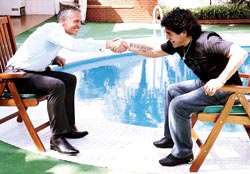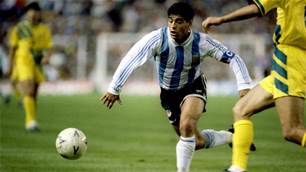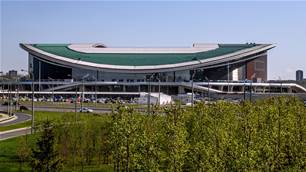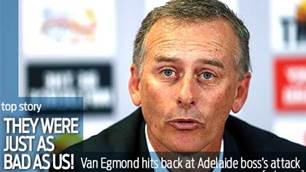In 1986 Maradona broke England striker Gary Linekar's heart. But when they met 20 years on, it was Argentina’s World Cup hero on the mend...
Page 3 of 3 | Single page
You were kicked out of the World Cup four years later in the USA for taking drugs. What are your thoughts on that?
It was a mistake. We used to take Rip Fuel, which doesn’t contain ephedrine here in Argentina but it does in America. It was a mistake on the part of my doctor. I was a cocaine addict at the time and that’s not an advantage, but if my intention had been to take a performance-enhancing drug I’d have chosen other stuff, not ephedrine.
How shocked were you when you got the news of the doping?
When they told me I’d tested positive, I was really hurt. I’d worked really hard to get to that World Cup and we had a great team who were good enough to fight for the title with Brazil. I’m convinced of that, because it wasn’t an irresistible Brazil.
Having been suspended, how were you received by your people when you returned home to Argentina?
My people have always been with me, with my family, my wife and my daughters. What was tough was not going back but being out of football for so long, and being a drug addict. I wasn’t taking drugs because I wasn’t playing football or because I didn’t score more goals or because I didn’t train everyday, I was taking them because I was addicted. It’s an illness, a disease, and today I thank God that I’m able to get up every day.
At one stage you were taken to a mental institute. How was that?
I felt... I felt bad, but my problem wasn’t madness, it was an addiction, an illness. But thanks to God I recuperated well, I recuperated for my daughters.
Given your weight problems and subsequent heart attacks, did you ever think “This is it, I’m going to die”?
No, you don’t realise that you’re going to die. One always wants to grieve, but I felt really bad when my youngest daughter told me that I was practically dead, and when she said to me, “Dad, live for me, live for me.” I was dying, practically dead, and she said “Daddy, daddy live for me.” I just thought, “Wow”.
Shortly after that, weighing almost 20 stone, you decided to have your stomach stapled in an effort to control your obesity. Was that scary?
Yes, but I had to do it because I was so overweight I couldn’t even walk. I’d stopped consuming drugs but I was almost diabetic and my blood pressure was so high. The doctors told me about this operation and I spoke to my daughters about it. We knew there were risks but I said: “I’m going to have it done, I’m going to do it.” It had to be done because the situation got out of control. Watching a football game I would eat two whole pizzas on my own. But I’m not anxious anymore and I eat very little now.
Was that the turning point?
Yes.
Were you aware of the massive feeling of affection for you from around the world?
Yes, and that also gave me the strength to recover as fast as possible. Seeing on television that people were praying for me, praying that I would get better – that gave me strength.
Do you feel that, with addiction, you have to reach rock bottom to make you realise there’s something worth fighting for?
Yes. The thing is, even while others want to help you, you’re out of reach. You shut yourself off inside and you don’t speak to anyone. I was almost dead, and you can’t go any lower than that. What makes me want to keep on living is being able to see my daughters every day. Before, I used to see them around, but I was addicted to drugs so I didn’t enjoy them, I didn’t touch them, I saw them but everything was just flashing by.
You’ve come a long way over the last 18 months or so...
Yes, it’s been a year since my operation and almost two years without drugs. I feel great and I get up every morning with lots of energy. I say I ought to thank the guy upstairs, ‘the beard’ as I call him. He gives me opportunities and I give my all to make the most of it.

Last night, I saw you playing football, and playing with great enthusiasm. What does the game mean to you these days?
It gives me freedom and allows me to enjoy myself. All sport is great but football is the most beautiful, the sport of kings. Running with a ball, running after a ball gives me great enjoyment and pleasure – it’s something much more powerful. For example, watching football: I watch the Premier League, the first B, the first C – on Wednesdays, on Thursdays, on Saturdays, on Sundays; English football, French football or whatever. My daughters call me and say: “What are you doing? Are you watching football?” Of course I am.
And you’ve a new career in TV...
We made a brilliant programme, La Noche del Diez, and we had great fun. We gave the people what they wanted and I really enjoyed myself. It wasn’t a question of my just going along to see what happened – I took the responsibility very seriously and it was a real challenge to me.
You’ve also got an interest in politics. Where did that come from?
No, I’m not interested in politics, it’s a dirty business. I don’t believe politicians.
So you won’t be President of Argentina?
No. I believe we have to make this a better country. But I also think we should be more self-critical in order to motivate these so-called politicians, the people who can give us a better country. Fidel Castro is the most iconic figure we have in the world. He risked his life for his land and he gives the people what he can.
So how do you see your future panning out? More TV work, or are you going to coach Argentina at some stage?
I’m moving towards the future. We’ll be doing the programme again, but I would also like to be in charge of the selection of the Argentinian team: I would love that.
It was a mistake. We used to take Rip Fuel, which doesn’t contain ephedrine here in Argentina but it does in America. It was a mistake on the part of my doctor. I was a cocaine addict at the time and that’s not an advantage, but if my intention had been to take a performance-enhancing drug I’d have chosen other stuff, not ephedrine.
How shocked were you when you got the news of the doping?
When they told me I’d tested positive, I was really hurt. I’d worked really hard to get to that World Cup and we had a great team who were good enough to fight for the title with Brazil. I’m convinced of that, because it wasn’t an irresistible Brazil.
Having been suspended, how were you received by your people when you returned home to Argentina?
My people have always been with me, with my family, my wife and my daughters. What was tough was not going back but being out of football for so long, and being a drug addict. I wasn’t taking drugs because I wasn’t playing football or because I didn’t score more goals or because I didn’t train everyday, I was taking them because I was addicted. It’s an illness, a disease, and today I thank God that I’m able to get up every day.
At one stage you were taken to a mental institute. How was that?
I felt... I felt bad, but my problem wasn’t madness, it was an addiction, an illness. But thanks to God I recuperated well, I recuperated for my daughters.
Given your weight problems and subsequent heart attacks, did you ever think “This is it, I’m going to die”?
No, you don’t realise that you’re going to die. One always wants to grieve, but I felt really bad when my youngest daughter told me that I was practically dead, and when she said to me, “Dad, live for me, live for me.” I was dying, practically dead, and she said “Daddy, daddy live for me.” I just thought, “Wow”.
Shortly after that, weighing almost 20 stone, you decided to have your stomach stapled in an effort to control your obesity. Was that scary?
Yes, but I had to do it because I was so overweight I couldn’t even walk. I’d stopped consuming drugs but I was almost diabetic and my blood pressure was so high. The doctors told me about this operation and I spoke to my daughters about it. We knew there were risks but I said: “I’m going to have it done, I’m going to do it.” It had to be done because the situation got out of control. Watching a football game I would eat two whole pizzas on my own. But I’m not anxious anymore and I eat very little now.
Was that the turning point?
Yes.
Were you aware of the massive feeling of affection for you from around the world?
Yes, and that also gave me the strength to recover as fast as possible. Seeing on television that people were praying for me, praying that I would get better – that gave me strength.
Do you feel that, with addiction, you have to reach rock bottom to make you realise there’s something worth fighting for?
Yes. The thing is, even while others want to help you, you’re out of reach. You shut yourself off inside and you don’t speak to anyone. I was almost dead, and you can’t go any lower than that. What makes me want to keep on living is being able to see my daughters every day. Before, I used to see them around, but I was addicted to drugs so I didn’t enjoy them, I didn’t touch them, I saw them but everything was just flashing by.
You’ve come a long way over the last 18 months or so...
Yes, it’s been a year since my operation and almost two years without drugs. I feel great and I get up every morning with lots of energy. I say I ought to thank the guy upstairs, ‘the beard’ as I call him. He gives me opportunities and I give my all to make the most of it.

Last night, I saw you playing football, and playing with great enthusiasm. What does the game mean to you these days?
It gives me freedom and allows me to enjoy myself. All sport is great but football is the most beautiful, the sport of kings. Running with a ball, running after a ball gives me great enjoyment and pleasure – it’s something much more powerful. For example, watching football: I watch the Premier League, the first B, the first C – on Wednesdays, on Thursdays, on Saturdays, on Sundays; English football, French football or whatever. My daughters call me and say: “What are you doing? Are you watching football?” Of course I am.
And you’ve a new career in TV...
We made a brilliant programme, La Noche del Diez, and we had great fun. We gave the people what they wanted and I really enjoyed myself. It wasn’t a question of my just going along to see what happened – I took the responsibility very seriously and it was a real challenge to me.
You’ve also got an interest in politics. Where did that come from?
No, I’m not interested in politics, it’s a dirty business. I don’t believe politicians.
So you won’t be President of Argentina?
No. I believe we have to make this a better country. But I also think we should be more self-critical in order to motivate these so-called politicians, the people who can give us a better country. Fidel Castro is the most iconic figure we have in the world. He risked his life for his land and he gives the people what he can.
So how do you see your future panning out? More TV work, or are you going to coach Argentina at some stage?
I’m moving towards the future. We’ll be doing the programme again, but I would also like to be in charge of the selection of the Argentinian team: I would love that.
Related Articles

When the Socceroos met Maradona at the SFS

FIFA 'took note' of Maradona's antics













